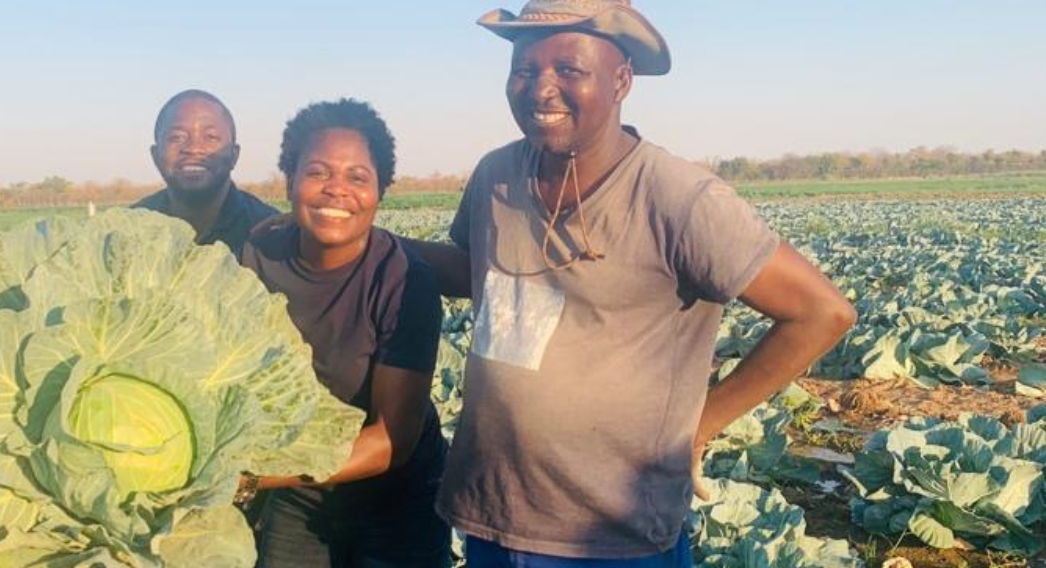
In Olushandja, in the Epalela area, found in Northern Namibia, in the Omusati region, are numerous ambitious agronomists trying to survive on small-scale farming and are determined to bridge the gap of food insecurity in the country. Along the Olushandja dam and the canal is one such farmer, Sylvanus Naunyango, owner of Nyango Vegetable Projects CC, who’s contribution to agriculture is very profound. He grows heaps of fruits and vegetables, tries to adopt new approaches to agriculture and aspires to be one of the largest producing farmers in Namibia.
Sylvanus’s love for farming is palpable. Since taking up his role as a farmer in 1995, Sylvanus officially left his job as a civil servant in 2017, to pursue his passion for farming on a full-time basis. Owning 21 hectares of land dedicated to producing horticultural products, here he produces mainly onion, cabbage, tomato, beetroot, butternut, sweet potato and gem squash. Active and involved in community matters, he also occupies the role of Chairperson of the Olushandja Horticultural Producers Association, where a hundred and five (105) other farmers meet on occasion to brainstorm, give one another technical advice and tackle issues concerning the community farmers.
This association was established in 2005 and has since become a primary pillar for farmers to air their grievances, but most importantly to consider areas for growth, such as their dire need to penetrate the formal markets which is high on their priority list.
“It is difficult for us to penetrate the formal markets. Particularly to supply big retailers and government institutions. We have quality produce, we are knowledgeable, have the technical know-how and other abilities, but we are not benefiting from procurement procedures.” Naunyango said.
Other challenges farmers here are faced with and by far the most challenging, is the lack of water in the Olushandja dam and surrounding areas, especially towards the end of the year. By then water levels drop immeasurably. Expensive inputs are a concern for farmers as well. “Things like seeds or diesel are also expensive. Knowing that we are not producers of seeds in this country, we are more reliant on other countries, specifically South Africa to supply us with seeds, which makes things very difficult in carrying out farming activities” he says. As for diesel they need fuel to pump water from the Olushandja dam to the fields. Incorporating solar pumps to replace using the fuel are environmentally friendly but is an expensive exercise as well.
The Fund, since the start of its relationship with Mr. Naunyango, has contributed 21 bags of 50kg organic fertilizers. EIF has sponsored about 37 tons of organic fertilizers.
Mr. Naunyango was on one of 35 members of the Olushandja Farmers Association who benefited from this project. “EIF has exposed me to this amazing alternative method of disposing inorganic fertilizers and replacing it with organic fertilizers. It is a more substantial way of farming and can lead to a longer life-span of my field”, said Sylvanus.
The Fund’s Monitoring and Evaluation Specialist, Ms. Aina- Maria Iteta, said that Mr. Naunyango was one of the direct beneficiaries, raising 21 bags for his project to the value of N$ 50 000 (Fifty Thousand Namibian Dollars). “Five years ago Mr. Naunyango was receptive to consider our suggestion of implementing and incorporating a new method of farming and five years later him and the other famers from the association are still using this organic fertilizer” Iteta said.
She added that the initial aim of the project was to create awareness and promote the use of organic fertilizer among farmers to improve soil structure, soil fertility and ensuring that scarce farming land is protected by minimizing the use of chemical fertilizer which has long lasting detrimental effects on the soil” she further utters.”
EIF also did a post monitoring assessment which evaluates the adoption of this locally produced organic fertilizers and the findings were impressive and very encouraging.
Greenfields Organic Fertilizers is a 100% Namibian and situated in Okahandja. “Growth at home strategy can only be realised if Namibians support and use their locally produced inputs in transforming the agricultural sector which is more affordable as compared to the importation of production inputs from other countries “ according to Iteta.
The mandate of the Fund is to ensure the sustainable use and management of environmental and natural resources.
This is achieved by investing in projects that improve the use of natural resources or help reduce adverse effects on the environment. The Fund has developed several policies and procedures to ensure that it delivers on its mandate effectively and efficiently. This includes a stringent vetting process for every project, which n some cases includes actual site inspections and community engagements
Prior to the outbreak of the COVID- 19 pandemic, the Fund had a positive future outlook. The emergence of COVID-19 has eroded an estimated 60% of the Fund’s revenue for the 2020/21 financial year, hence impacting negatively on its cash flow, liquidity, and operations The Fund is adamant on its approach on smart agriculture and multidisciplinary approaches.
By Nicole van Wyk

